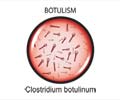A nematode worm and a light-emitting strain of bacteria work together to prey on soil-dwelling insects and kill their insect hosts.
A nematode worm and a light-emitting strain of bacteria work together to prey on soil-dwelling insects and kill their insect hosts. Scientists speaking at the Society for General Microbiology's 161st Meeting at the University of Edinburgh, UK, that runs from 3-6 September 2007 are now investigating the potential role of these toxins in bacteria pathogenic to humans.
Speaker Michelle Hares, of the University of Exeter, studies insect-killing nematode worms which have symbiotic bacteria living in their guts. When the worm encounters insect prey, it burrows into the insect’s body and regurgitates the bacteria. These bacteria, called Photorhabdus luminescens, then release toxins directly into the insect’s bloodstream, rapidly killing it. The insect’s flesh then provides food for the bacteria and in turn the bacteria are food for the nematode.“Once inside an insect, caterpillar or larva, the bacteria release a mixture of toxins which kill the victim”, says Michelle Hares of the University of Exeter’s Cornwall Campus. “The toxins we identified are made up of three different proteins, and all three are needed to kill the insect”.
The Cornwall based scientists also discovered that the same genes needed to make these protein toxins are found in the Yersinia pestis bacteria which caused the bubonic plague, and in Yersinia pseudotuberculosis which causes thousands of cases of gastroenteritis today.
When the toxic proteins from both these human pathogenic bacteria were fed to tobacco hornworm caterpillars they had no effect, but when the same proteins were put on living cells from humans both Yersinia bacteria strains killed the cells.
“Our initial interest in this group of toxins, was centered around the hunt for novel insecticides, but our work now suggests they may also play an important role in the evolution of human and mammalian disease”, says Michelle Hares.
“Our findings suggest that insecticidal toxin complexes have been adapted by the Yersinia family of bacteria to attack mammalian cells. We are therefore currently investigating exactly how the toxin complexes elicit their response and how they are involved in the evolution of pathogenic disease in Yersinia”.
LIN /J
 MEDINDIA
MEDINDIA
 Email
Email










